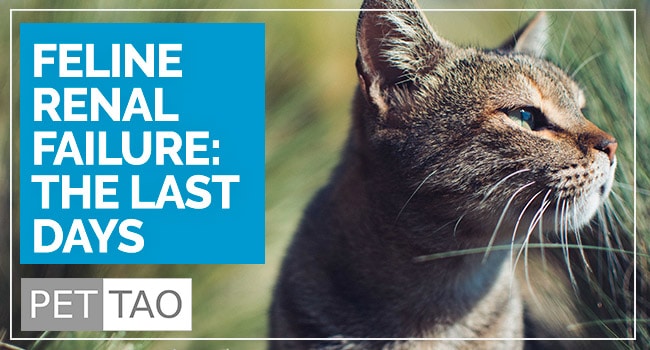Unfortunately, kidney disease traumatizes both the pet owner and their feline family member.
This article guides you through the end-stage treatment options and explains your cat’s prognosis, life expectancy, and quality of life issues.
But first, cat kidney problems can be sudden (acute renal failure) or gradual (chronic renal failure).
Distinct differences exist between the two.
Acute Kidney Injury – Acute Renal Failure (ARF)
Acute renal failure is a serious and usually sudden condition often triggered by an event or “insult,” such as your cat eating something poisonous like antifreeze or a toxic plant.
Renal failure is usually treated with IV fluids (also called a drip) and other medications. If your cat survives the crisis, he or she can often regain all or most of his/her normal kidney function.
Chronic Kidney Disease – Chronic Renal Failure (CRF)
Chronic Kidney Disease, or CRF, is an ongoing disease related to progressive loss of kidney function. The goal in treating chronic renal failure is to help your cat maintain the remaining renal function as long as possible.
Symptoms of Renal Failure
Cat kidney failure symptoms include weight loss, vomiting, increased water consumption, diarrhea, and constipation.
Behavioral changes accompany renal failure and include restlessness, nighttime vocalizing, and sometimes dementia.
Advanced cases result in severe weight loss, severe dehydration, and vomiting blood.
You must be aware of the signs of kidney failure in cats and visit your veterinarian for examination and treatment if needed.
Treatment for kidney disease includes renoprotective therapies, such as nutritional support, food therapy, electrolyte treatment, and other holistic options.
So, How Long Will My Cat Live?
This question lingers in any pet parent with a cat suffering from renal failure. The prognosis is vastly different between cats with acute and chronic kidney disease.
The Prognosis for acute renal failure…guarded.
The prognosis for acute renal failure depends on the following:
- What caused the renal failure?
- Is renal failure curable?
- How soon did you discover your cat’s illness?
- Was the treatment prompt and aggressive?
Unfortunately, many cats succumb to acute renal failure and the prognosis depends on the above factors.
The Prognosis for chronic renal failure…favorable.
The prognosis for chronic renal disease is favorable, especially in the early stages (also called the first stage), with most cats improving and returning to a close to a normal quality of life, depending on their age and general health.
With diligent and consistent care, many of these cats can live for years. They live happily and many times succumb to a different disease.
Here’s what you need to do…
Change the Diet—A renal diet and food therapy are beneficial to cats suffering from chronic kidney disease.
For example, diets designed for cats with chronic renal failure are usually designed to be pH neutral or alkalinizing with low protein and increased vitamins.
Take Blood Pressure—Since blood pressure could be a precipitating cause, cat owners should seek professional veterinary diagnosis and treatment for hypertension.
Water, water, water—Dehydration is a common symptom and sequel of kidney disease, so fluid therapy and holistic care are important in helping a cat maintain proper body chemistry.
Final Thoughts
While chronic kidney disease is a terminal disease, there is good news regarding the quality of life and life expectancy in the final stages of kidney failure in cats.
For example, many cats can live for months and even years if they receive proper treatment and care for chronic renal failure.
They can continue a close-to-normal quality of life, especially because cats are very resilient and self-reliant.
Some cats eventually die of other causes, while chronic renal failure remains under control through the above-mentioned treatment measures.
However, chronic renal failure is progressive over time, so pet owners should monitor their loved ones’ health and seek treatment and prevention as early as possible.
End-Stage Disease
End-stage renal failure has few treatment options, as the terminal progression continues.
Sometimes, veterinarians recommend euthanasia when the quality of life is an issue.
Other times, euthanasia is your best choice—a gift you can give to your best friend.
Powerful Tools for Cat Renal Failure Challenges
There are several quick and easy changes you can make at home to help you give your cat an edge on easing kidney disease and renal failure challenges.
- Learn more about cat renal failure.
- Ask your vet about Epakitin. Epakitin is a chitosan-based supplement that helps with the filtering your cat’s kidneys can no longer do.
- Home cook for your pet. Go to our slow-cooker recipe page and try one of our cat food recipes for kidney disease or renal failure. Make sure to run it by your holistic vet first!
- Learn more about TCVM Herbal Remedies. Chinese medicine offers many amazing natural solutions for cat renal failure Some good examples are:








